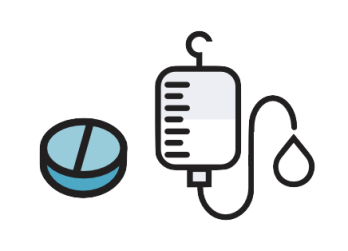
Combining the Drugs Venetoclax and Rituximab as a First Treatment for Waldenström’s Macroglobulinemia
What is the purpose of this clinical trial?
Waldenström’s macroglobulinemia (WM) is a rare type of lymphoma. It is also called lymphoplasmacytic lymphoma.
This trial aims to improve the first treatment people receive for WM. It will test a combination of 2 drugs, venetoclax and rituximab.
Researchers will compare this study treatment to the current treatment that patients usually first receive for WM. The drugs in the current treatment are ibrutinib and rituximab.
Both treatments use rituximab. The study doctors want to find out if combining it with venetoclax instead of ibrutinib is better for patients.
This trial is set up to find out:
- If WM responds better to treatment that combines venetoclax and rituximab or ibrutinib and rituximab
- How long WM stays controlled by each of the treatments
- What side effects people have from each of the treatments
Why is this trial important?
Previous research showed that combining venetoclax and rituximab can work well against WM that came back or didn’t respond to other treatment. There is also evidence that the treatment using venetoclax may be less likely to cause side effects of the heart. This trial is a way to find out if the new drug combination could offer a better option for patients who are starting treatment for WM.
Who can be in this trial?
This trial is for adults, age 18 or older, with Waldenström’s macroglobulinemia.
This trial may be for people who:
- Have symptoms that require starting treatment for WM
- Have not started treatment for WM, or only received treatment with rituximab at least 6 months ago
This trial is not for people who:
- Have poor kidney, liver, or bone marrow function
- Have an active HIV or Hepatitis C infection
- Are pregnant
Talk with your doctor to learn more about who can join this trial.
What treatments will I get?
If you join this study, you will be assigned to one of 2 study groups.
|
Group 1: ibrutinib and rituximab (usual treatment) |
Group 2: venetoclax and rituximab |
Your doctor will not have control over which group you will be assigned to. This helps make sure the study results are fair and reliable.
If the cancer gets worse or comes back before you finish treatment in Group 1 or 2, you may stop that treatment and start the treatment that you did not get assigned to.
- If you started in Group 1, you may choose to get further treatment with venetoclax and rituximab instead.
- If you started in Group 2, you may choose to get further treatment with ibrutinib and rituximab instead.
How long will I be in the trial?
In total, you will be in the study for 5 years.
Each study treatment can include 24 treatment cycles, which takes about 2 years to complete.
After treatment, you will have follow-up visits with the study team until 5 years after you started the study.
Are there costs? Will I get paid?
The study drug, venetoclax, is provided free to you. You will not be paid for joining the study. Check with your health care provider and insurance provider to find out what costs will and won’t be covered in this study.
Where can I find more information about this trial?
- Talk with your health care provider
- Call the National Cancer Institute at 1-800-4-CANCER
- Go to www.ClinicalTrials.gov and search the national clinical trial number: NCT04840602
- For a list of trial locations, visit swog.org/NCI-S2005

